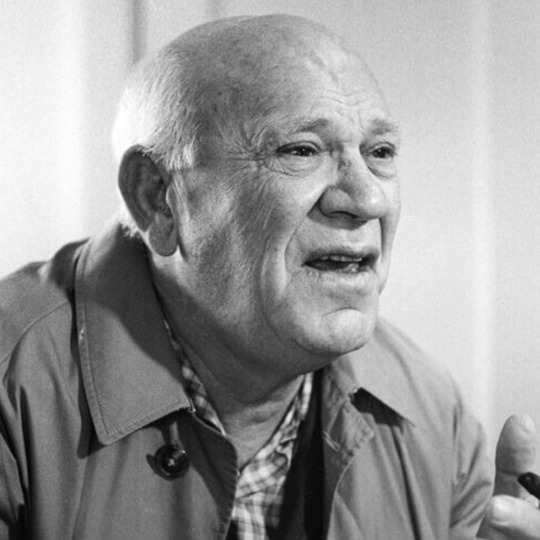#eric hoffer
Explore tagged Tumblr posts
Text
"Rudeness is the weak man's imitation of strength." - Eric Hoffer
#quote of the day#quote of today#eric hoffer#rudeness#boorishness#disrespect#incivility#insolence#lack of manners#manners#roughness#imitation#strength#durability#firmness#impregnability#robustness#soundness#solidity#solidness#stability#sturdiness#toughness#in the light of certain events#manners maketh man
176 notes
·
View notes
Text
People whose lives are barren and insecure seem to show a greater willingness to obey than people who are self-sufficient and self-confident. To the frustrated, freedom from responsibility is more attractive than freedom from restraint. They are eager to barter their independence for relief of the burdens of willing, deciding and being responsible for inevitable failure. They willingly abdicate the directing of their lives to those who want to plan, command and shoulder all responsibility.
Eric Hoffer
89 notes
·
View notes
Text

“Rudeness is the weak man's imitation of strength.”
— Eric Hoffer
#eric hoffer#literature#lit#literature lover#literature quote#literature quotes#philosophy#philosophical#philosopher#philosophers#philosophy of life#philosophy quote#philosophy quotes#quote#quotes#excerpts#excerpt#quoteoftheday#booklover#book#bookworm#books#booklr#book quotes#book quotations
249 notes
·
View notes
Text
The remarkable thing is that we really love our neighbor as ourselves: we do unto others as we do unto ourselves. We hate others when we hate ourselves. We are tolerant toward others when we tolerate ourselves. We forgive others when we forgive ourselves. We are prone to sacrifice others when we are ready to sacrifice ourselves. It is not love of self but hatred of self which is at the root of the troubles that afflict our world.
— Eric Hoffer, The Passionate State of Mind (Harper & Brothers, 1953) (via Alive on All Channels)
22 notes
·
View notes
Text

The image of an elderly Black man raising his cane at the president, calling the Right out for cutting poor people's healthcare, and refusing to back down, is powerful. Instead of condemning Green, Dems should understand that he is an inspiring model for real resistance.
+
“For men to plunge headlong into an undertaking of vast change, they must be intensely discontented yet not destitute, and they must have the feeling that by the possession of some potent doctrine, infallible leader or some new technique they have access to a source of irresistible power. They must also have an extravagant conception of the prospects and the potentialities of the future. Finally, they must be wholly ignorant of the difficulties involved in their vast undertaking. Experience is a handicap.” ― Eric Hoffer, The True Believer: Thoughts on the Nature of Mass Movements
22 notes
·
View notes
Text

Eric Hoffer
Créditos de la imagen a quien correspondan.
#solxs#mabel#eric hoffer#mayo2024#pub 5#frases#escritos#citas#notas#pensamientos#textos#escrituras#imágenes#quotes en español#quotes en tumblr
78 notes
·
View notes
Text
إن الإحباط هو نوع من الإفلاس - إفلاس الروح التي تنفق الكثير في الأمل والتوقعات. إريك هوفر
Disappointment is a sort of bankruptcy - the bankruptcy of a soul that expends too much in hope and expectation. Eric Hoffer

#eric hoffer#quotes#إريك هوفر#اقتباسات#الإحباط#الأمل#اقتباس#تمبلريات#تمبلر بالعربي#صورة واقتباس#اقتباسات تمبلر#تمبلر#مما راق لي#حياة#فلسفة#نصوص#أدب
13 notes
·
View notes
Text
"Cuando las personas tienen libertad para hacer lo que quieren, por lo general comienzan a imitarse mutuamente".
–Eric Hoffer.

#eric hoffer#libertad#literatura#libros#libro#imagen#imágenes#imagen con texto#imágenes con texto#frases#frases en español#frase#frase en español#quotes#cita en español#cita#citas#citas en español#escritores#escrito#escritos#escritor#foto#fotografia
6 notes
·
View notes
Text
To believe that if we could have but this or that we would be happy is to suppress the realization that the cause of our unhappiness is in our inadequate and blemished selves. Excessive desire is thus a means of suppressing our sense of worthlessness.
The Passionate State of Mind
Eric Hoffer
32 notes
·
View notes
Text
The readiness for self-sacrifice is contingent on an imperviousness to the realities of life. He who is free to draw conclusions from his individual experience and observation is not usually hospitable to the idea of martyrdom. For self-sacrifice is an unreasonable act. It cannot be the end-product of a process of probing and deliberating. All active mass movements strive, therefore, to interpose a fact proof screen between the faithful and the realities of the world. They do this by claiming that the ultimate and absolute truth is already embodied in their doctrine and that there is no truth nor certitude outside it. The facts on which the true believer bases his conclusions must not be derived from his experience or observation but from holy writ. “So tenaciously should we cling to the world revealed by the Gospel, that were I to see all the Angels of Heaven coming down to me to tell me something different, not only would I not be tempted to doubt a single syllable, but I would shut my eyes and stop my ears, for they would not deserve to be either seen or heard.”
To rely on the evidence of the senses and of reason is heresy and treason. It is startling to realize how much unbelief is necessary to make belief possible. What we know as blind faith is sustained by innumerable unbeliefs. The fanatical Communist refuses to believe any unfavorable report or evidence about Russia, nor will he be disillusioned by seeing with his own eyes the cruel misery inside the Soviet promised land.
It is the true believer’s ability to “shut his eyes and stop his ears” to facts that do not deserve to be either seen or heard which is the source of his unequaled fortitude and constancy. He cannot be frightened by danger nor disheartened by obstacles nor baffleed by contradictions because he denies their existence. Strength of faith, as Bergson pointed out, manifests itself not in moving mountains but in not seeing mountains to move.
And it is the certitude of his infallible doctrine that renders the true believer impervious to the uncertainties, surprises and the unpleasant realities of the world around him. Thus the effectiveness of a doctrine should not be judged by its profundity, sublimity or the validity of the truths it embodies, but by how thoroughly it insulates the individual from his self and the world as it is. What Pascal said of an effective religion is true of any effective doctrine: it must be “contrary to nature, to common sense and to pleasure.”
The effectiveness of a doctrine does not come from its meaning but from its certitude. No doctrine however profound and sublime will be effective unless it is presented as the embodiment of the one and only truth. It must be the one word from which all things are and all things speak.
Crude absurdities, trivial nonsense and sublime truths are equally potent in readying people for self-sacrifice if they are accepted as the sole, eternal truth. It is obvious, therefore, that in order to be effective a doctrine must not be understood, but has rather to be believed in. We can be absolutely certain only about things we do not understand. A doctrine that is understood is shorn of its strength. [...]
The devout are always urged to seek the absolute truth with their hearts and not their minds. “It is the heart which is conscious of God, not the reason.” Rudolph Hess, when swearing in the entire Nazi party in 1934, exhorted his hearers: “Do not seek Adolph Hitler with your brains; all of you will find him with the strength of your hearts.”
When a movement begins to rationalize its doctrine and make it intelligible, it is a sign that its dynamic span is over; that it is primarily interested in stability. For, as will be shown later, the stability of a regime requires the allegiance of the intellectuals, and it is to win them rather than to foster self-sacrifice in the masses that a doctrine is made intelligible.
If a doctrine is not unintelligible, it has to be vague; and if neither unintelligible nor vague, it has to be unverifiable. [...] When some part of a doctrine is relatively simple, there is a tendency among the faithful to complicate and obscure it. Simple words are made pregnant with meaning and made to look like symbols in a secret message. There is thus an illiterate air about the most literate true believer. He seems to use words as if he were ignorant of their true meaning. Hence, too, his taste for quibbling, hair-splitting and scholastic tortuousness.
— Eric Hoffer, The True Believer: Thoughts on the Nature of Mass Movements
13 notes
·
View notes
Text
«There seems to be a general assumption that brilliant people cannot stand routine; that they need a varied, exciting life in order to do their best. It is also assumed that dull people are particularly suited for dull work. We are told that the reason the present-day young protest so loudly against the dullness of factory jobs is that they are better educated and brighter than the young of the past.
Actually, there is no evidence that people who achieve much crave for, let alone live, eventful lives. The opposite is nearer the truth. One thinks of Amos the sheepherder, Socrates the stonemason, Omar the tentmaker. Jesus probably had his first revelations while doing humdrum carpentry work. Einstein worked out his theory of relativity while serving as a clerk in a Swiss patent office. Machiavelli wrote The Prince and the Discourses while immersed in the dull life of a small country town where the only excitement he knew was playing cards with muleteers at the inn. Immanuel Kant’s daily life was an unalterable routine. The housewives of Konigsberg set their clocks when they saw him pass on his way to the university. He took the same walk each morning, rain or shine.. The greatest distance Kant ever traveled was sixty miles from Konigsberg. (Hebrew, Greek, Persian, Christian, German, Italian, German figures)
The outstanding characteristic of man’s creativeness is the ability to transmute trivial impulses into momentous consequences. The greatness of man is in what he can do with petty grievances and joys, and with common physiological pressures and hungers. “When I have a little vexation,” wrote Keats, “it grows in five minutes into a theme for Sophocles.” To a creative individual all experience is seminal --- all events are 9equidistant from new ideas and insights --- and his inordinate humanness shows itself in the ability to make the trivial and common reach an enormous way. (English, Greek figures)
An eventful life exhausts rather than stimulates. Milton, who in 1640 was a poet of great promise, spent twenty sterile years in the eventful atmosphere of the Puritan revolution. He fulfilled his great promise when the revolution was, dead, and he in solitary disgrace. Cellini’s exciting life kept him from becoming the great artist he could have been. It is legitimate to doubt whether Machiavelli would have written his great books had he been allowed to continue in the diplomatic service of Florence and had he gone on interesting missions. It is usually the mediocre poets, writers, etc., who go in search of stimulating events to release their creative flow. (English, Italian figures)
It may be true that work on the assembly line dulls the faculties and empties the mind, the cure only being fewer hours of work at higher pay. But during fifty years as a workingman, I have found dull routine compatible with an active mind. I can still savor the joy I used to derive from the fact that while doing dull, repetitive work on the waterfront, I could talk with my partners and compose sentences: in the back of my mind, all at the same time. Life seemed glorious. Chances are that had my work been of absorbing interest I could not have done any thinking and composing on the company’s time or even on my own time after returning from work.
People who find dull jobs unendurable are often dull people who do not know what to do with themselves when at leisure. Children and mature people thrive on dull routine, while the adolescent, who has lost the child’s capacity for concentration and is without the inner resources of the mature, needs excitement and novelty to save off boredom.»
Eric Hoffer, I Savor the Joy of Dull Work
6 notes
·
View notes
Text

“Rudeness is the weak man's imitation of strength.”
— Eric Hoffer
#eric hoffer#literature#lit#literature lover#literature quote#literature quotes#english literature#philosophy#philosophical#philosopher#philosophers#philosophy of life#philosophy quote#philosophy quotes#quote#quotes#excerpts#excerpt#quoteoftheday#booklover#book#bookworm#books#booklr#book quotes#book quotations
128 notes
·
View notes
Text
By Eric Hoffer (LA Times 5/26/68)
The Jews are a peculiar people: things permitted to other nations are forbidden to the Jews.
Other nations drive out thousands, even millions of people and there is no refugee problem. Russian did it, Poland and Czechoslovakia did it, Turkey threw out a million Greeks, and Algeria a million Frenchman. Indonesia threw out heaven knows how many Chinese-and no one says a word about refugees. But in the case of Israel the displaced Arabs have become eternal refugees.
Everyone insists that Israel must take back every single Arab. Arnold Toynbee calls the displacement of the Arabs an atrocity greater than any committed by the Nazis.
Other nations when victorious on the battlefield dictate peace terms. But when Israel is victorious it must sue for peace. Everyone expects the Jewsto be the only real Christians in this world.
Other nations when they are defeated survive and recover but should Israel be defeated it would be destroyed. Had Nasser triumphed last June he would have wiped Israel off the map, and no one would have lifted a finger to save the Jews.
No commitment to the Jews by any government, including our own, is worth the paper it is written on. There is a cry of outrage all over the world when people die in Vietnam or when two Negroes are executed in Rhodesia. But when Hitler slaughtered Jews no one remonstrated with him.
The Swedes, who are ready to break of diplomatic relations with America because of what we do in Vietnam, did not let out a peep when Hitler was slaughtering Jews. They sent Hitler choice iron ore, and ball bearings, and serviced his troop trains to Norway.
The Jews are alone in the world. If Israel survives, it will be solely because of Jewish efforts. And Jewish resources. Yet at this moment Israel is our only reliable and unconditional ally. We can rely more on Israel than Israel can rely on us. And one has only to imagine what would have happened last summer had the Arabs and their Russian backers won the war to realize how vital the survival of Israel is toAmerica and the West in general.
I have a premonition that will not leave me; as it goes with Israel so will it go with all of us. Should Israel perish the holocaust will be upon us.
34 notes
·
View notes
Quote
Some of the worst tyrannies of our day genuinely are "vowed" to the service of mankind, yet can function only by pitting neighbor against neighbor. The all-seeing eye of a totalitarian regime is usually the watchful eye of the next-door neighbor.
Eric Hoffer

19 notes
·
View notes
Text
"Hatred is the most accessible and comprehensive of all the unifying agents. Mass movements can rise and spread without belief in a God, but never without belief in a devil."
Eric Hoffer, philosopher and author (25th July 1902-1983)
5 notes
·
View notes
Text

Mike Luckovich
* * * *
Unless a man has the talents to make something of himself, freedom is an irksome burden...We join a mass movement to escape from individual responsibility, or, in the words of an ardent young Nazi, 'to be free from freedom.' It was not sheer hypocrisy when the rank-and-file Nazis declared themselves not guilty of all the enormities they had committed. They considered themselves cheated and maligned when made to shoulder responsibility for obeying orders. Had they not joined the Nazi movement in order to be free from responsibility?
—Eric Hoffer, The True Believer: Thoughts on the Nature of Mass Movements (1951)
#Mike Luckovich#freedom#responsibility#Thanksgiving#political cartoons#Eric Hoffer#The True Believer: Thoughts on the Nature of Mass Movements#quotes
14 notes
·
View notes